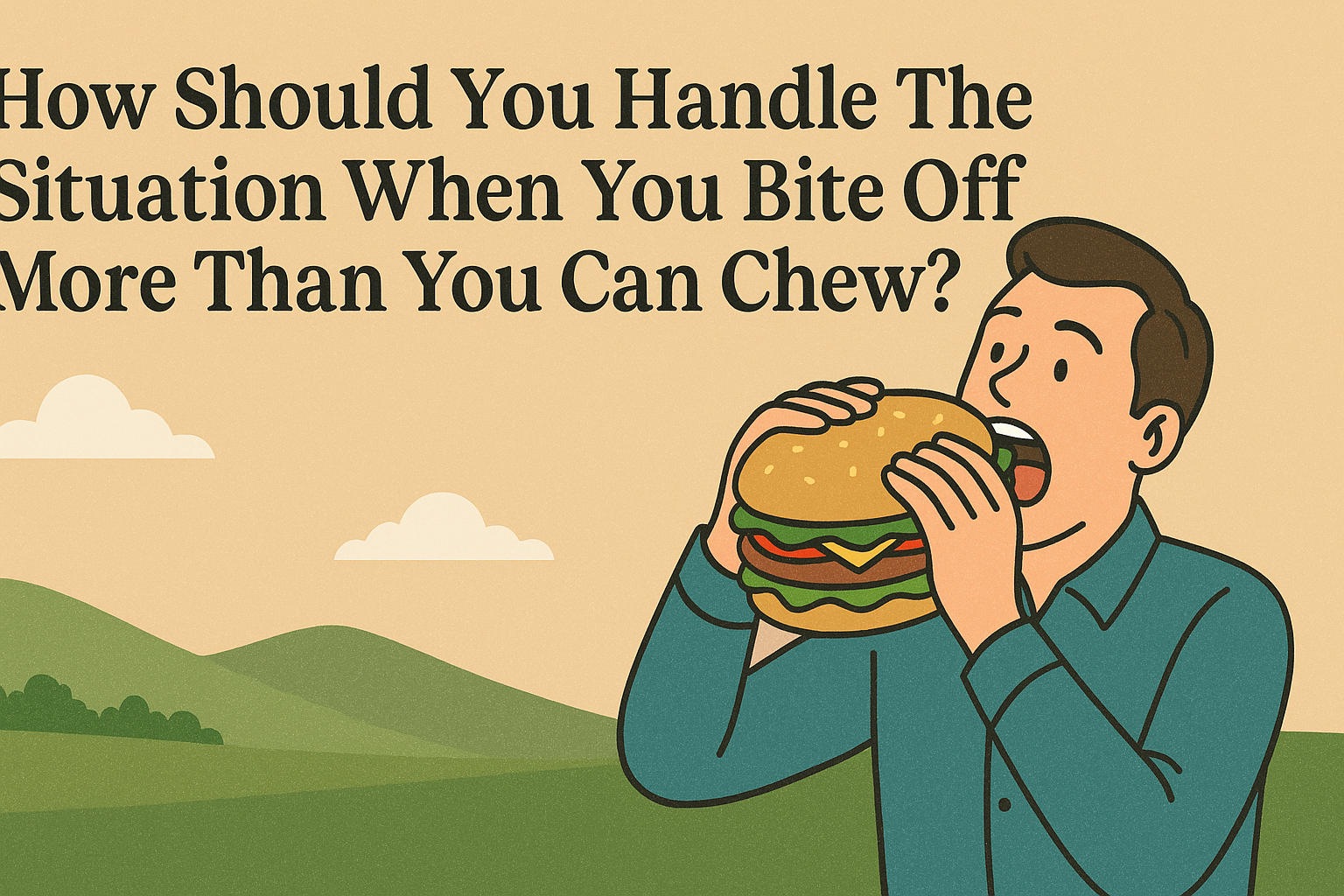Summary
The idiom is believed to have originated in the United States during the 19th century, likely tied to the practice of chewing tobacco. When someone took too large a bite of smoking, they would struggle to chew or speak properly—an apt metaphor for overextending oneself. The phrase began appearing in print in the 1870s and quickly gained traction in the American vernacular.
Core Meaning
To “bite off more than you can chew” means to take on a task, responsibility, or commitment that exceeds one’s capacity to manage effectively. It implies a lack of foresight or an overestimation of one’s abilities, often resulting in stress, failure, or the need to scale back.
Modern Usage Across Contexts
1. Workplace and Career
In professional settings, the idiom is frequently used to describe employees or entrepreneurs who overcommit:
“She bit off more than she could chew by agreeing to lead three major projects simultaneously.”
It’s also a common phrase in performance reviews or team discussions, often used to encourage realistic goal-setting.
2. Education
Students use the phrase when they take on too many courses, extracurriculars, or responsibilities:
“Between my thesis, part-time job, and volunteer work, I’ve bitten off more than I can chew this semester.”
3. Finance and Real Estate
In financial contexts, it describes individuals or businesses that take on excessive debt or investment risk:
“Buying that second property without a stable income was biting off more than we could chew.”
4. Politics and Public Policy
Political analysts use it to critique overly ambitious government initiatives:
“The administration bit off more than it could chew with its sweeping healthcare reform.”
5. Social and Personal Life
In everyday life, it’s used when someone overcommits socially or personally:
“I agreed to host Thanksgiving and Christmas back-to-back—I’ve bitten off more than I can chew!”
Comparison with Similar Idioms
- “In over your head” – Suggests being overwhelmed or outmatched by a situation, often due to lack of experience or preparation.
- “Overextend yourself” – Implies spreading oneself too thin, often financially or emotionally.
- “Burn the candle at both ends” – Refers to exhausting oneself by doing too much, especially without rest.
Each of these idioms shares thematic overlap with “bite off more than you can chew,” but with subtle differences in tone and implication.
Realization
When you realize you’ve bitten off more than you can chew, it’s helpful to pause and say something to yourself that acknowledges the situation while also guiding your next steps. Here are a few constructive self-talk phrases you might use:
6. Acknowledging the Overcommitment
- “Okay, I’ve taken on too much. Time to reassess.”
- “This is more than I can realistically handle right now.”
- “I overestimated my capacity—lesson learned.”
7. Reframing the Situation
- “It’s not failure—it’s feedback. I can adjust.”
- “I’m not stuck. I can prioritize and delegate.”
- “This is a growth moment, not a defeat.”
8. Planning a Way Forward
- “What can I drop, delay, or delegate?”
- “Let me break this down into manageable parts.”
- “I need to set clearer boundaries moving forward.”
Here’s a checklist of idioms related to “bite off more than you can chew”, helpful in comparing nuances in meaning and usage:
✅ Idioms Checklist: Overcommitment & Overwhelm
- Bite off more than you can chew
- Meaning: Take on more than you can handle.
- Context: Work, personal life, finance, politics.
-
In over your head
- Meaning: Being overwhelmed or outmatched.
- Context: New roles, complex tasks, unfamiliar situations.
-
Overextend yourself
- Meaning: Spread yourself too thin, often financially or emotionally.
- Context: Budgeting, multitasking, caregiving.
- Burn the candle at both ends
- Meaning: Exhaust yourself by working too hard or too long.
- Context: Work-life balance, academic stress.
- Running before you can walk
- Meaning: Attempting something advanced before mastering the basics.
- Context: Learning, business startups, skill development.
- Jumping the gun
- Meaning: Acting prematurely or without preparation.
- Context: Decision-making, announcements, investments.
- Throw yourself in the deep end
- Meaning: Start something difficult without preparation.
- Context: New jobs, leadership roles, public speaking.
- Spread yourself too thin.
- Meaning: Commit to too many tasks, reducing effectiveness.
- Context: Scheduling, multitasking, volunteering.
Conclusion
“Bite off more than you can chew” remains a powerful idiom in modern language, offering a colorful warning against overambition and poor planning. Whether in boardrooms, classrooms, or dinner tables, its message is clear: know your limits, and think before you commit.
